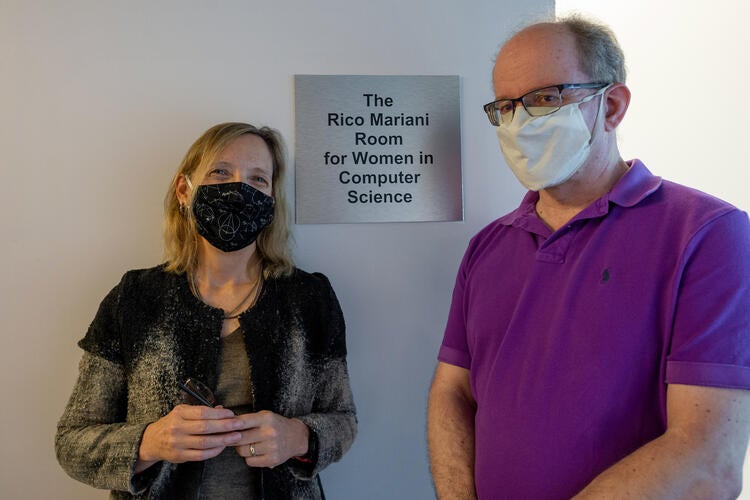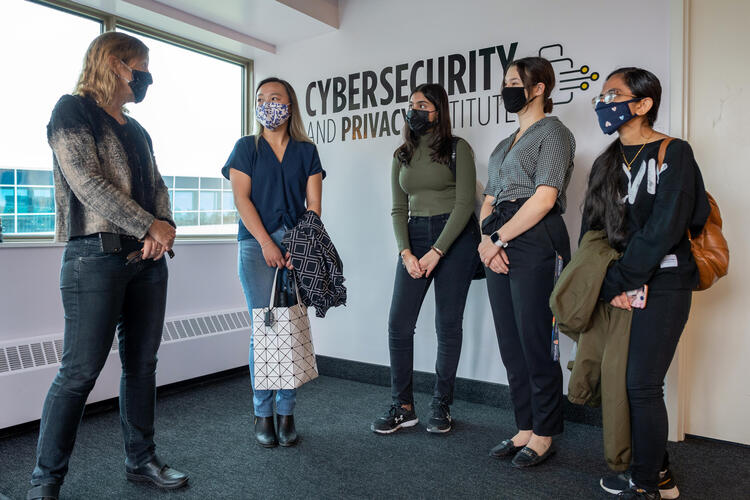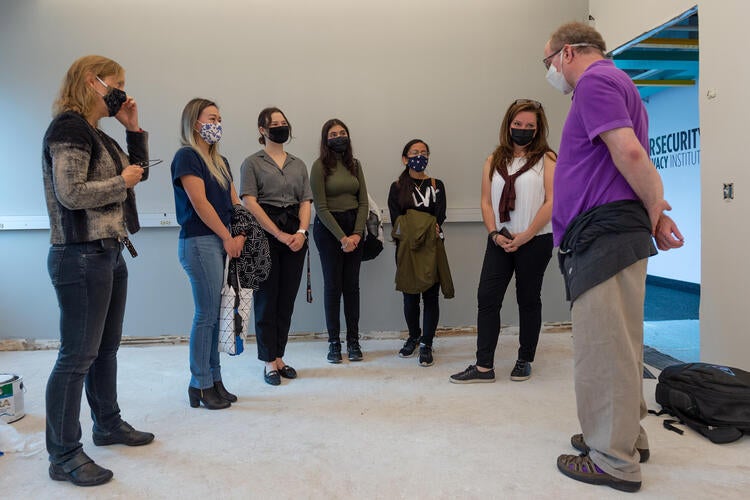Get set to check out the brand-new Women in Computer Science (WiCS) room in Davis Centre, a welcoming space where women in math and computer science can lean in, study and connect.

It’s a rainy Friday afternoon in mid-October and Audrey Ho has just popped her head in at DC 3150, a room at the end of the hall that overlooks the courtyard. It’s empty except for boxes and a few cans piled near the windows. The concrete floor is prepped for new carpet, the modern light fixtures are newly installed and a tradesperson has just reminded everyone the walls are still tacky with wet paint. Power tools whir in the background.
Although the space is still a work in progress, Ho, a third-year Computer Science student, is excited.
“WiCS has always metaphorically represented support, encouragement and community. So being able to take that metaphor and bring it to life would be a really great help,” she says. “The space doesn’t have to be for studying. It could be for working together, collaborating and sharing experiences.”
Give us some space
When it is completed before the holidays (fingers firmly crossed) the new room will serve as a dedicated space for women and gender diverse people in math and computer science, where they can find comradery and support. Not to mention whiteboards, a refrigerator, kettle and teapots. After a long day, the Women in Computer Science (WiCS) lounge is meant to be a soft place to land.

“Anyone who comes to this space is going to know there will be other women here,” says Jo Atlee, WiCS director and a Computer Science professor, there with Ho and a few other students. “Everywhere else, you’re in the minority–in the classroom, in the lab. Sometimes you just want to connect with another woman in the program.”
Atlee envisions using the space to run mock interviews too. Until now, finding room for them has been a headache.
As she finishes this thought, someone new enters the area.
“I told you not to put my name on it–you guys….”
It’s Facebook’s Rico Mariani (BMath ’88), the room’s donor and industry thought leader. He’s motioning to the plaque outside the door calling the space, “The Rico Mariani Room for Women in Computer Science.” He sounds exasperated but he’s laughing along with everyone else before being assured that the plaque can be swapped out later. For today it was installed as a sign of thanks and respect.
Supporting the cause
Mariani decided to fund the room after speaking with WiCS students a couple of years ago about what he could do to support them. And although he’s nodding, he’s gently adamant that the plaque needs to go.
“I didn’t want women coming in here and thinking, ‘Oh great. A middle-aged white guy’s room, right?’ I wanted the room to be about the people who are here,” says Mariani, a well-known ally for women working in computer science who has created multiple scholarships at Waterloo.

But Ho assures him his gesture is considered more empowering than paternalistic. And stepping up sometimes requires stepping into the spotlight.
“At least from my perspective, I actually really appreciate you stepping forward and not being anonymous. A lot of sponsors and advocates are female, so being able to see male advocates really means a lot,” she tells him.
Research supports her belief. A recent study shows that, particularly for women working in STEM careers, male allyship reduces feelings of isolation and expectations of workplace hostility more than if the ally is female. What’s more, male allies set a positive, inclusive tone for the entire organization.
Mariani is the first to agree with Atlee that the room is not meant to segregate the female students either. Instead, it’s about recognizing that some students face barriers and challenges others don’t. They need a space where they can decompress and feel safe to be themselves. He points out that many tech businesses install yoga, television or quiet rooms for the same purpose. After all, math and computer science degrees and careers are hard enough without the “extra, bonus BS,” as he puts it.
“Any time you can find a place where you can unburden in any way, that’s good,” says Mariani. “So it’s very easy to justify having a space like this.”





